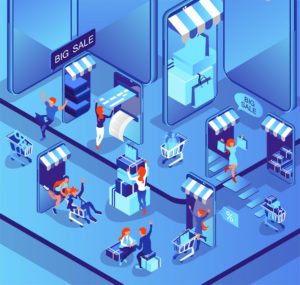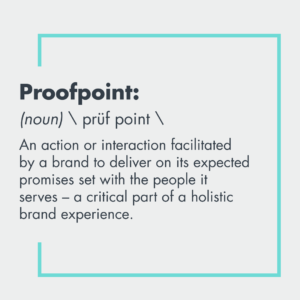Jack Blog
September 27th, 2018
There’s been a lot said over the years about the impending death of retail.
 And if any business is going to stem this tide, it’s a retailer who understands a core consumer truth: Humans have an innate desire to belong, to be part of something bigger than ourselves.
And if any business is going to stem this tide, it’s a retailer who understands a core consumer truth: Humans have an innate desire to belong, to be part of something bigger than ourselves.
Because though it appears we want to buy things, what we really want is to buy in.
So retailers need to focus less on selling us something, and more on making us feel something.
Storefronts need to transform from a place to buy…to a place to be.
Setting the standard
Apple is already viewing their retail stores as “town squares” – a place where you cannot just buy, but gather, meet, learn and—yes—belong. So it’s not surprising to see they ranked within the top 5 (in the UK) and 10 (in the US) of Jack Morton’s Experience Brand Index – a global research study of 6,000 consumers, 100 brands and 10 industries – proving they are a true Experience Brand that understands the importance of delivering positive, meaningful customer interactions.
As brands, Jeep, Mini and Harley Davidson have set the shopper marketing standard for selling a sense of belonging. They don’t sell vehicles. They sell a tribe.
USAA doesn’t sell insurance; they sell gratitude and reciprocal commitment—greeting every member who calls not just with their name, but also their military rank.
Fostering a community
In many storefronts that once housed traditional retail concepts, Orange Theory, SoulCycle and Barry’s Bootcamp all get many of us out of bed not because we can’t get that workout somewhere else (and less expensively), but because we can’t replicate that rush of energy, that collective buzz, that sense of inclusion and community.
On main streets everywhere, coffee shops and bars have been able to charge huge premiums for years because they create the feeling of being remembered, welcomed back. The perceived benefits of being a “regular” – one of the crowd, but still known uniquely as you.
Subscription services cracked the belonging code years ago. You don’t just get sent a box of organic diapers, pre-measured groceries, curated beauty products or hand-selected clothes. You’re a member whose needs, whose preferences are remembered, understood.
But here’s the thing: calling it a membership alone doesn’t create a true sense of belonging, even if it’s a successful business. After all, Amazon’s Prime customers are called “members”, but do they actually feel like they are a part of something—or just that they’re upgraded to the equivalent of a seat with more legroom? How many of us have countless loyalty cards that don’t make us feel very loyal at all? For how many of us has one-to-one e-CRM marketing long ago lost the feeling of a real Relationship?
Because technology has us more connected than ever. But to what, exactly? Vivek Wadhwa, Distinguished Fellow, Harvard Law School says technology actually has us “feeling more isolated, lonely and disconnected than ever.”

Shopper Marketing: Moving from transactions to relationships
So, as brands, we have real opportunity to fill this belonging gap. To infuse our touchpoints – aka proofpoints – with both individual and collective experiences that will make our customers know that we truly value them. And while we’ll strive to do this for all interactions with customers, we’ll ensure our in-store experiences are proactive, empathetic, generous.
Because our retail stores won’t survive on selling stuff alone. They’ll survive—and thrive—by selling an extraordinary in-store experience that feels personal, but is delivered to everyone. If we want our customers to show passion for our business, we have to show the same passion for theirs.
Put simply, at retail and in life, we don’t want transactions. We want relationships. Because we’re not just handing over our money, we’re giving our time. We’re giving over a piece of ourselves.
And the only way to keep our products and services from becoming a commodity is to avoid treating our customers like one.